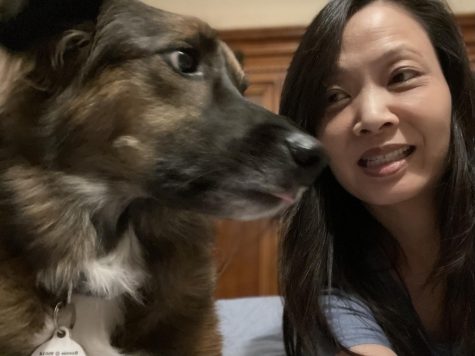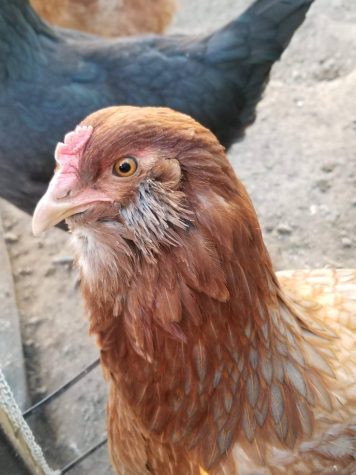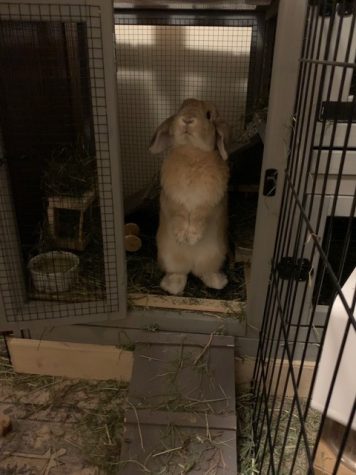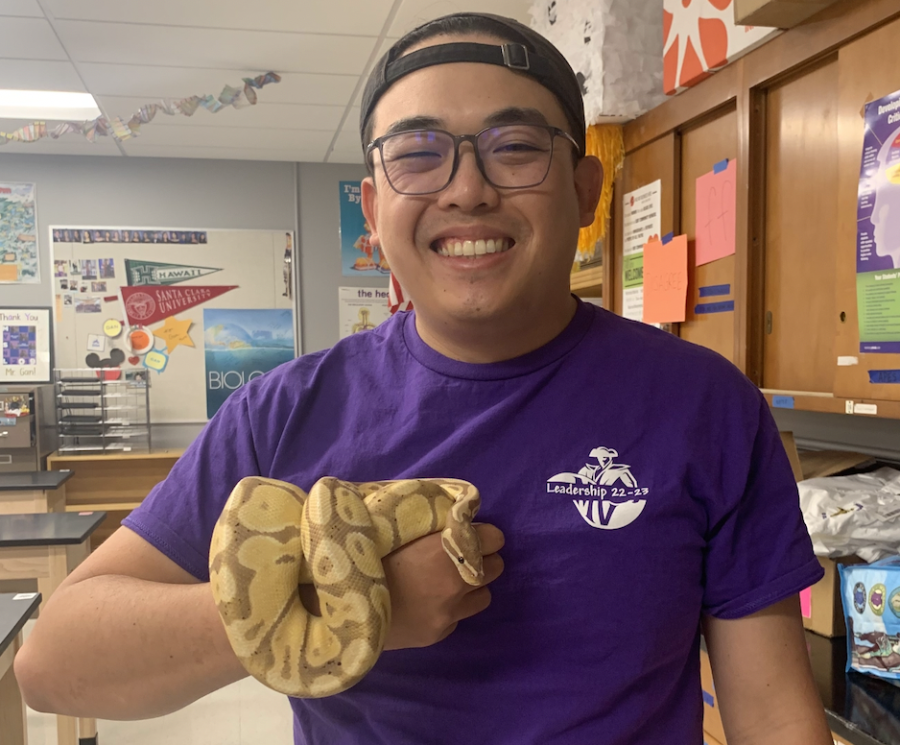Animal Love
Exploring teachers’ pets and the impact they have on them
October 10, 2022
Kenneth Gan
Biology teacher Kenneth Gan has had his banana ball python named Udon since it was just a hatchling. After getting Udon through an old roommate who used to breed ball pythons, Gan came up with the name through a meme where snakes were called “Udon noodles,” thick noodles used in Japanese cuisine. Though Gan had a lot of pets, he had never had a reptile before and thought it would be a cool idea to get one.
“I’ve always wanted a class pet,” Gan said. “Being a science teacher, I think it brings an interesting aspect to the class because ball pythons do have some cool genetics, so it works really well to use him as an example in various simulations in my curriculum.”
Gan adds that Udon’s biggest impact was bringing more energy and enthusiasm to his classes due to his uniqueness.
“It’s a really cool conversation starter for not only myself, but in the classroom,” Gan said. “Having a ball python as a pet is a little different than having a dog, or a cat or any other animal that you would interact with on a day-to-day basis. I don’t necessarily interact with Udon on a day-to-day basis, but I will bring him out to students, and I think that’s had the most positive impact. It’s just the interests, conversations and questions that I get about him that are really fun.”

Photo by I-Chu Chang
I-Chu Chang
Bonnie, a Formosan Mountain Dog and German Shepherd mix, was a 5-month-old stray before she lived in an animal shelter in Taiwan. A month later, Chinese teacher I-Chu Chang saw Bonnie’s picture on the internet and read that she was a rescue dog up for adoption. Chang volunteered to bring her over to the United States.
“[Adopting Bonnie] was very difficult at first,” Chang said. “When our previous dog died, we had her for 15 years, and I cried for six months, every single day. I told myself, ‘I’m not gonna adopt a dog anymore,’ because it was too painful. But somehow I browsed on the internet and saw an [animal rescuer] talking about adopting Bonnie and I kind of hesitated at that moment, but saw that the dog was very cute.”
Though Chang hesitated to adopt Bonnie at first, the inspiring words from the animal rescuer changed Chang’s mind.
“[The animal rescuer] realized that we [had] just lost a dog, and she said that if you have the power to love [one] dog, why don’t you get another one too so you can pass your love to another dog instead of having the dog stay in the shelter?” Chang said. “You are painful but you have so much love to give. Why don’t you try it?
Chang says that Bonnie is very different from other dogs, which has had a huge impact on Chang.
“She is not like a dog,” Chang said. “She is like a cat who won’t come to us. It was very difficult to get used to it because when I called out her name she wouldn’t come to me. She would make sure I’m not hurting her because she got abused in the past. People would walk on the street and kick her so she got very scared of people. Gradually she was able to come out and sort of interact with us, but still in a very unique way. But every day I talk to her and say ‘Bonnie, no worries, I don’t want to hurt you, I love you.’”

Shozo Shimazaki
Due to the pandemic, English teacher Shozo Shimazaki decided to adopt four chickens from a mail-order company. Because the company had every breed he wanted, he planned his order ahead of the hatching date and “literally” received four chickens in a box in the mail. Shimazaki’s daughter, Kimika, named them Coco, Maddie, Luna and Lindsey on the spot, taking inspiration from names of her friends and other pets that she knows. For example, Lindsey was associated with Kimika’s favorite Women’s Basketball player at Santa Clara University named Lindsey Van Allen.
“When the pandemic started, my daughter’s birthday was coming up in June and she wanted chickens,” Shimazaki said. “The actor Tom Holland bought chickens at the start of the pandemic when eggs were scarce in stores, so we got the idea.”
Shimazaki finds watching the chickens very interesting due to their unique behaviors. According to Shimazaki, taking care of the chickens is easy because their shelter has an automatic door that the chickens naturally know to go through at night, their food and water are in large containers that can last a long time and their poop bio-degrades into rich soil if Shimazaki and his family forgets to clean it.
“They are very cute and fun to watch, especially when we let them out of our coop,” Shimazaki said. “It’s interesting to watch them be so content in a smaller space, and their behavior [is] interesting because our chickens have a circular pecking order where one chicken is the pure alpha. Each one is both superior and inferior to at least one other chicken around them.”

Jessica Kaufman
English teacher Jessica Kaufman adopted a pet rabbit named Rue from one of her husband’s clients. The client had a rabbit that he wanted to give to someone else, and since Kaufman had a lot of rabbits growing up, she decided to adopt her. Kaufman says she and her husband initially thought the rabbit was a boy, so they originally named her Rubert. When they found out she was a girl, they shortened the name to Rue.
One of Kaufman’s favorite memories of Rue is when she lets her out in the morning and Rue binkies, a rabbit behavior shown to be a sign of happiness.
“Every morning after I let her out for a few minutes, she does some laps around the room and then jumps in the air and it’s just always incredibly cute.,” Kaufman said. “I wait to leave the room to go get my cup of coffee so that she can finish because it’s just so cute.”
Though Rue has been sick recently and is getting better, she has a big impact on Kaufman, providing her an immense amount of happiness due to her cuteness and energy.
“Rabbits are so cute and have a lot of personality,” Kaufman said. “People don’t think that they have a lot of personality, but they have tons of personality. She’s always really fun to sit and play with and watch her hop around. She is [also] very calming. In one whole room of my house you can just go hang out in the rabbit room and it’s quiet. She’s super cute and when you get to pet her, you just can’t help but be happy. You can’t help but smile because she’s very cute.”




























